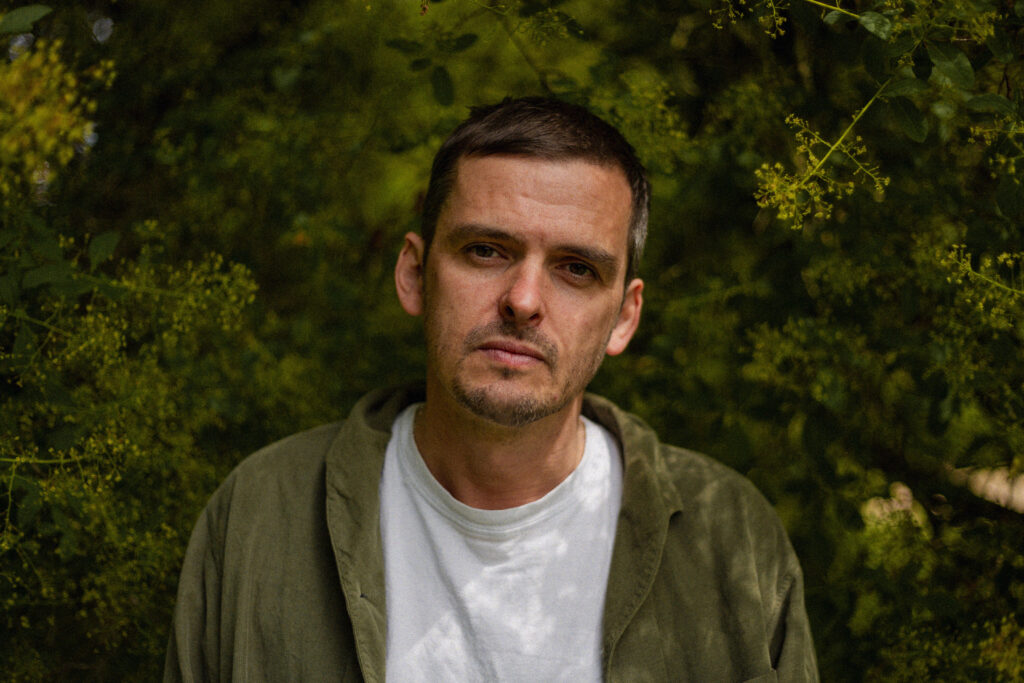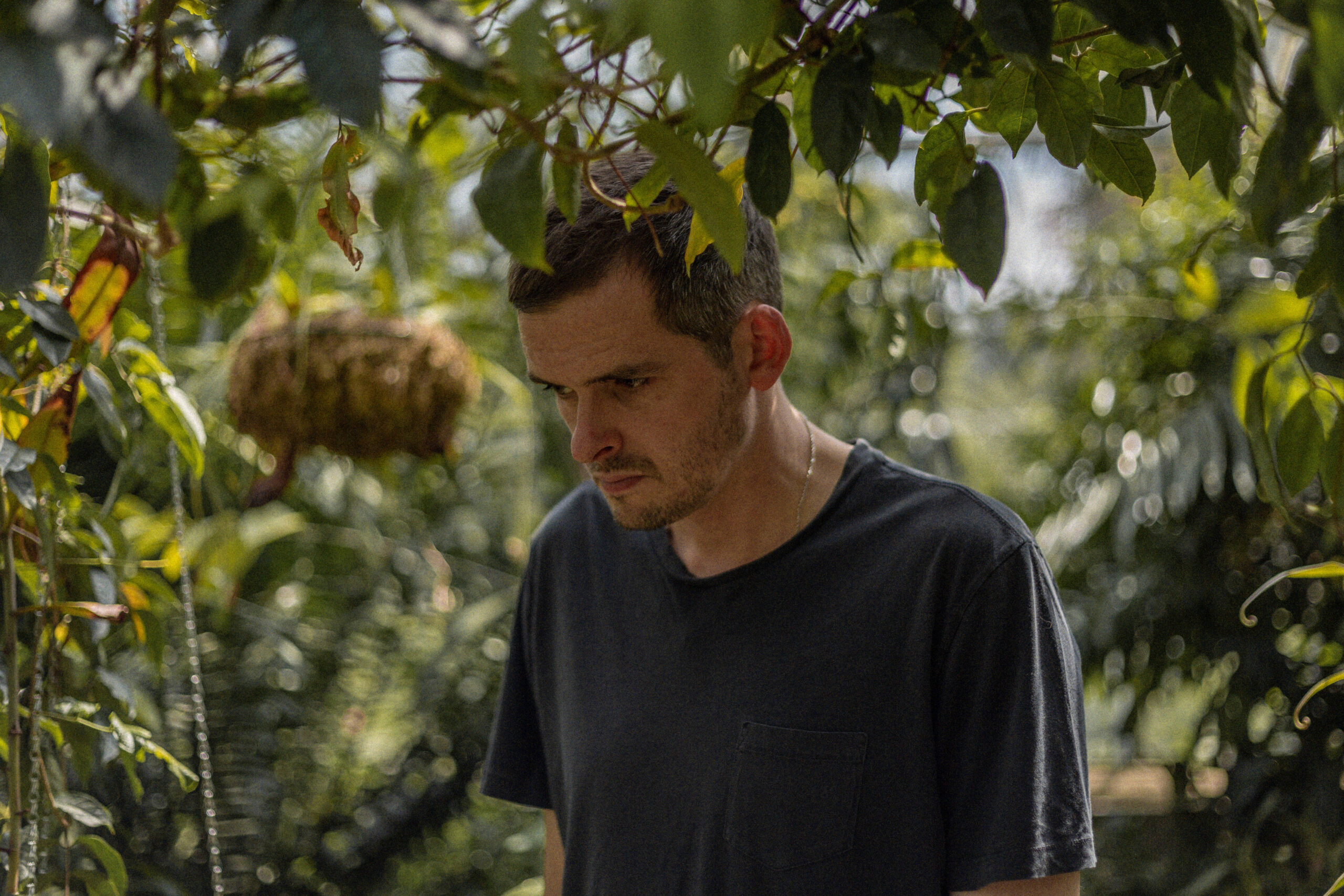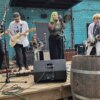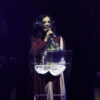Finding a sense of order within chaos has been an ongoing pursuit for Jack Cooper‘s Modern Nature since the band’s conception some four years ago. New album No Fixed Point In Space picks up the the theme but pushes further, exploring life’s complexities, challenges, dramas, pleasures, and inevitable conclusion. Beginnings, endings and everything in between. It beckons us to focus on the big questions by heading into the sparser, more reflective world introduced by 2021’s aural world-building experience Island of Noise. More minimalist than previous works, with No Fixed Point In Space we float in a sound bath of understated beauty, the light and dark and shade explored. But this is not a passive experience or akin to one previously trod; the unsettling undertones, underlying tensions and anxieties see to that.
Notation-based arrangements and orchestration but with improvisational freedoms was the methodology of its jazz inflected creation, and the woodwind, percussion, strings, voice generously share time and give way to clean air and each other. The resulting album is free from clutter or distractions, with rare and precious space to breathe, and think.
Long-term collaborators Jeff Tobias (Sunwatchers), Jim Wallis, Jeff Tobias are joined by Chris Abrahams (The Necks) Alex Ward (This Is Not This Heat/Spiritualized) Dominic Lash, Mira Benjamin, Heather Roche and Anton Lukosvieve from Apartment House, and Ed Deegan make up the roll call for this release, with unexpected guest vocals from Julie Tippetts (Driscoll). Her first appearance on record for some years adds an eerie, ethereal quality to the songs. The ensemble worked within a collective mindset, the intimacy of human contribution resonating. Railing against the negative impacts of excessive modernity, in terms of recording techniques anyway, they recorded live and on tape, eschewing the ease and temptation of digital. A warm pulse versus cold metal chill. Modern Nature talk the talk and walk the walk in encouraging emotional immediate connection; at the Murmuration festival curated by them in Essex this coming weekend, all artists on the lineup will perform without amplification.
There is commonly a widespread fear of quiet and space both in music and outside of it, I suggest to Jack. And a compulsion to fill it and any perceived gaps, like a problem desperately requiring a solution. But No Fixed Point In Space very much offers an invitation to actively listen, to let the music and silences sink in. It gifts us the opportunity to concentrate, on who and what is important.
The space present on this album is not nothing; it is the recording of a room or a lull in music. ‘It is a very tangible thing,’ Jack says, reflecting on the work of John Cage who appalled and intrigued audiences in equal measure with his piece 4’ 33” and theory any auditory experience including atmosphere can constitute music. Cage famously became aware of his own biological inner workings, his nervous and circulatory system, in a room of deadened air. ‘It became apparent to him there was no such thing as silence,’ Jack adds in approval.
Modern Nature are not scared of silence in song, or quiet atmosphere. Anyone who has enjoyed them play observes that. It’s quite thrilling to perform in such a way, he says. ‘It feels like a high wire act. It’s exciting.’

The album title was inspired by a dance choreographed by Merce Cunningham’s ‘Fixed Point In Space’ taken from a similar assertion by Albert Einstein. ‘I think a lot of music that I hear is very linear, it moves from one point in time to another, a to b. The way a lot of music is made today on computers with a lot of sections that are literally cut and paste, drum loops and things like that, seems very stationery. I wanted to make something that was the opposite.’
It fits in with Modern Nature’s nature, for want of a better word, that this the band’s third studio album – we won’t count the live, the mini album, EP, cassettes, and side projects – should achieve, as with the previous, a progression from what they’ve done even in the very recent past. ‘There’s a lot of lip service artists pay to progression and experimentation. It’s that classic thing, I remember when I was a kid, bands would be in the NME talking about direction or experimentation and that would mean they just had keyboards or a drum machine on the next album,’ Jack jokes.
Now there’s a thought.
In the here and now in 2023 Modern Nature draw our attentions to a wider chaos of ‘the natural world’, as he calls it. The definition here is not literal, as in bird and trees and fish and wild animals; although certainly one could enjoy the new record with them primarily in mind. ‘I mean what it is to be alive, and the space that we’re in. I wanted it to feel like the music was circular and going back to the start, bits circling around and orbiting. We have a two year old girl now and that seismic change in life is one of the things that the record is about and we’ve lost people over the past couple of years as well. I don’t want to get bogged down in the imagery of nature because I’m trying to talk about something much bigger than that.’
‘Murmuration’ is a case in point. We’ve all witnessed birds doing the instinctive loose looped dance at sunset whether in a rural scene or circling church spires in a more urban setting, if we take the time to look upward. The song suggests we mind the similarities between humans and those anonymous birds, the way we all interact.
‘It’s difficult to see something like that and not be moved on a visual level. But also it’s no different to what we’re doing. We’re no more important than those starlings. We’re all co-dependent.’
With this in mind he challenges the hierarchical traditions of music, enjoying the idea of all elements – instrumentation, contributions – carrying equal importance. ‘I wanted things to feel further away, feel quieter, feel louder, for it all to be moving in and out of each other and the title feeds into that. The image that invoked in me was an ecosystem where everything was moving in and out of each other, is co-dependent, as important as the last thing.’
The last time we spoke, Jack threatened the possibility of no vocals. The thought process around that being, the moment lyrics are sung it pulls at attentions, elevated above everything else. ‘That’s something I want to move away from. I really sincerely believe that music can convey emotions and feelings that words can’t. There’s something about music that is inexplicable and is far closer to how human beings think and imagine than language. I suppose I want to get closer to that. I have a greater chance of this music resonating with people if it’s closer to what is going on in people’s heads.’ The use of voice on this release is interesting when one bears this in mind. Tippetts’ harmonising adds to the unsettling feel; the notion of the voice as an instrument in itself never truer. On ‘Orange’ however, Cooper sings the line ‘don’t let it break you’ with such firmness it causes quite a start.
The songs are definitely songs, Jack stresses; after all, he can sit down and play them on a guitar if needs must and there are verses and choruses. But that urge to dismantle conventions persists. On the recording a lot of the traditional signifiers in pop music are removed, perceived cliches stripped away. ’Whether it comes with age or experience, I’m quite accepting that some people will be into this now, but will take a while to reach all the people it will resonate with. It’s quite intense music and demands a lot of you as a listener but hopefully there is reward there as well. Rather than, that’s a nice song, that’s a catchy one.’
The day we talk, the new record has further praise delivered upon it. Masterpiece is the biggest word attributed so far. Jack winces slightly. Not in faux modesty, I don’t think. More maybe because Modern Nature’s evolution has further brave phases to come.
‘I don’t think I’ve got better or worse at writing melodies. There could be a way of framing these songs that would be quite instant but it’s not what I’m interested in anymore. I don’t want to replicate what’s already happened.‘
Bravo to that.
No Fixed Point In Space is released on Bella Union on 29 September.
Modern Nature tour dates:
30/09/23: Murmuration: A Festival Of New Music – Newport, Essex
11/12/23 : Hare and Hounds – Birmingham
12/12/23 : The Smokehouse – Ipswich
13/12/23 : Lewes Con Club – Lewes
14/12/23 : Rough Trade – Bristol
15/12/23 : Café Oto – London
16/12/23 : Café Oto – London
17/12/23 : Brudenell Social Club
18/12/23 : Glad Café – Glasgow
19/12/23 : The Carlton Club – Manchester




